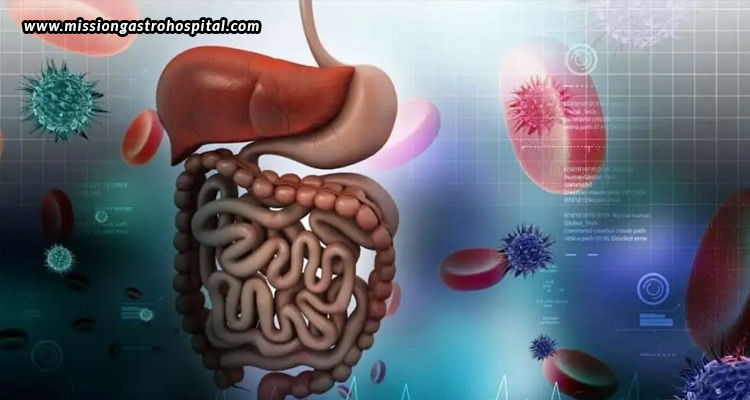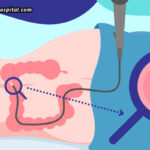The intricate workings of the gastrointestinal system are indispensable to our overall well-being as they regulate how food is broken down, how nutrients are absorbed, and how waste is eliminated from the body. However, a variety of malfunctions can arise from this intricate system, leading to a range of gastrointestinal disorders. Let’s dig into the world of common gastrointestinal problems in this insightful examination, revealing their subtle symptoms, complex underlying factors, and wide range of possible treatments. By educating ourselves about these conditions, we enable ourselves to identify any warning signs, seek prompt medical attention, and start along a path to recovery. Come along on this enlightening journey as we unravel the mysteries of the gut and demystify gastrointestinal disorders to promote better health.
Gastritis
Gastritis is characterized by the inflammation of the stomach lining, which can be acute or persistent.
- Symptoms – Consistent signs and symptoms include nausea, vomiting, indigestion, and bloating, along with searing or uncomfortable stomach pain. A person’s food habits and quality of life may be impacted by these symptoms, which can range in severity and persist over time.
- Causes – Gastritis develops as a result of several circumstances. Stress, long-term use of nonsteroidal anti-inflammatory medicines, excessive alcohol use, and Helicobacter pylori infection are the main contributing factors. Furthermore, a few autoimmune diseases can cause the stomach lining to be attacked by the immune system, which can result in inflammation and gastritis.
- Treatment – The goals of gastritis treatment plans are to reduce symptoms, encourage healing, and deal with underlying problems. This frequently entails taking medications like histamine receptor blockers or proton pump inhibitors to lessen the production of stomach acid. If there is an Helicobacter pylori infection, antibiotics may be recommended. The management and prevention of gastritis can also be greatly aided by dietary adjustments, such as avoiding hot or acidic meals, and lifestyle changes, such as adopting stress reduction techniques and limiting alcohol intake.
Gastroesophageal Reflux Disease (GERD)
Gastroesophageal reflux disease, or GERD, is characterized by the recurrent reflux of stomach acid into the throat, which results in the lining of the oesophagus to become inflamed and irritated.
- Symptoms – Common signs and symptoms include chest discomfort, dysphagia (difficulty swallowing), burning in the chest or throat, heartburn, and persistent coughing. The frequency and severity of these sensations might vary, and they frequently get worse after eating or right before bed.
- Causes – GERD can result from a number of conditions that impair the lower oesophageal sphincter, a ring of muscle that ordinarily blocks acid reflux. Some of the possible causes include disorders that raise abdominal pressure, such as pregnancy, obesity, or hiatal hernias, which weaken the c. The symptoms may additionally worsen through certain lifestyle decisions like smoking and consuming particular meals and drinks, such as citrus fruits, coffee, or fatty foods.
- Treatment – GERD can be managed through a mix of medication, lifestyle changes, and, in extreme situations, surgical procedures. A change in lifestyle might involve giving up smoking, reducing weight, and eliminating trigger foods. H2-receptor antagonists and proton pump inhibitors are two examples of medications that can help lessen the production of stomach acid and relieve symptoms. Surgical techniques to strengthen the lower oesophageal sphincter or repair a hiatal hernia may be explored in situations when conservative approaches are ineffective.
Peptic Ulcer Disease
Peptic ulcers are characterized by open sores that develop on the lining of the stomach, small intestine, or oesophagus.
- Symptoms – Frequent signs and symptoms include nausea, vomiting, bloating, searing or painful stomach discomfort, and inadvertent weight loss. These symptoms can vary in intensity and occur sometimes or frequently, but they are certain to affect a person’s daily routine and general well-being.
- Causes – Two main factors are frequently responsible for the development of peptic ulcers: extended use of nonsteroidal anti-inflammatory medicines or Helicobacter pylori infection. Nonsteroidal anti-inflammatory medicines, such as ibuprofen and aspirin, can irritate the stomach lining and hinder its healing process, which raises the possibility of ulcer development. But, if there is a Helicobacter pylori infection, it weakens the stomach and small intestine’s protective lining, leaving them vulnerable to harm from stomach acid.
- Treatment – A multimodal strategy is usually used to treat peptic ulcers with the goals of eliminating the Helicobacter pylori infection, lowering stomach acid production, and easing the symptoms. The Helicobacter pylori bacterium is treated with antibiotics, and proton pump inhibitors help lessen the production of stomach acid, which promotes healing of the ulcer. Antacids can also be used to relieve pain and discomfort and other symptoms right away. Making lifestyle changes like giving up alcohol and NSAIDs can also help to promote ulcer healing and stop recurrence.
Inflammatory Bowel Disease (IBD)
The term “inflammatory bowel disease” (IBD) refers to a group of chronic inflammatory disorders of the digestive system, including ulcerative colitis and Crohn’s disease.
- Symptoms – Depending on the subtype of the disorder, symptoms might vary, although they frequently include exhaustion, diarrhoea, rectal bleeding, stomach discomfort, and unintentional weight loss. Furthermore, symptoms including fever, decreased appetite, and joint discomfort may be experienced by patients, which can have a major effect on their everyday functioning and quality of life.
- Causes – Although the precise origin of IBD is yet unknown, a complex interaction of immunological, environmental, and genetic variables is likely to be the reason. Genetic predisposition plays a significant role, with certain genetic mutations increasing the risk of IBD. Environmental factors that disturb the delicate balance of the gut microbiota, such as nutrition, smoking, and microbial infections, can also cause IBD to develop or worsen.
- Treatment – The goals of IBD treatment are to reduce the symptoms, bring the condition in control and keep it in remission, and avoid any complications. Medications that lower inflammation and alter the immune system, such as corticosteroids, immunomodulators, and biologic treatments that target certain inflammatory pathways, are commonly used in an all-encompassing strategy. Along with lifestyle adjustments like stress reduction and consistent exercise, dietary changes like avoiding trigger foods and maintaining enough nutrition can also help control the symptoms and enhance overall well-being. Surgery could be required in severe cases to remove damaged intestinal sections or treat consequences like strictures or fistulas.
Irritable Bowel Syndrome (IBS)
Irritable bowel syndrome (IBS) is a common gastrointestinal condition that affects the stomach and intestines.
- Symptoms – The IBS is marked by symptoms like changes in bowel habits, bloating, and pain or discomfort in the abdomen. Constipation, diarrhoea, or a mix of the two may be experienced by people with IBS without any obvious anatomical or biochemical abnormalities in the digestive system. The severity and length of symptoms might differ, frequently changing over time and affecting day-to-day activities and quality of life.
- Causes – Although the precise aetiology of IBS is still unknown, a number of variables may be involved with its development. Some foods, such as dairy, gluten, or foods high in fructooligosaccharides (FODMAPS), stress, hormonal changes, and intestinal bacterial overgrowth can all function as triggers for the symptoms of IBS. These elements may interfere with normal gut sensitivity and motility, resulting in IBS-like symptoms.
- Treatment – The goal of managing IBS is to reduce symptoms and enhance overall quality of life by using a mix of dietary adjustments, stress-reduction strategies, prescription drugs, and lifestyle adjustments. A low-FODMAPS diet can help get rid of trigger foods that make the symptoms worse. The intensity of symptoms can be lessened with the use of stress-reduction strategies including cognitive-behavioural therapy and relaxation exercises. Certain symptoms can be treated with medications like antispasmodics, laxatives, and certain antidepressants. Furthermore, lifestyle modifications like consistent exercise and enough sleep might help with overall gut health and IBS symptom management.
The care of gastrointestinal disorders must be individualized and comprehensive due to the significant impact they can have on a person’s quality of life. By having appropriate knowledge about the symptoms, causes, and treatments of the aforementioned gastrointestinal disorders can help with making educated healthcare decisions. Partnering with medical experts, like Ahmedabad’s Mission Gastro Hospital, which is well-known for providing specialized care for gastrointestinal disorders, guarantees customized treatments for optimum health. In order to prevent problems and achieve favourable results in gastrointestinal health, early diagnosis and management are essential. The superiority with which Mission Gastro Hospital considers gastro disease care Ahmedabad demonstrates its commitment to enhancing patient outcomes and fostering a healthier community.








